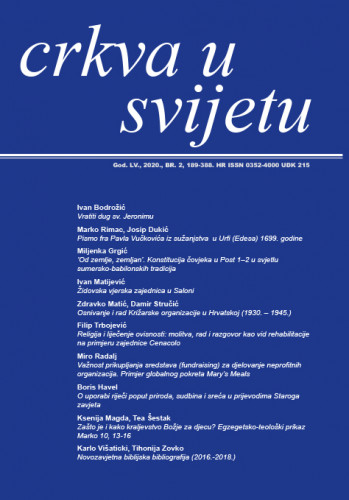Studija istražuje konstituciju čovjeka u Post 1–2, proučavajući važnije tekstove o stvaranju čovjeka u Mezopotamiji i biblijske izvještaje u Post 1–2. Pregled tekstova iz Mezopotamije pokazuje da sve ondje prisutne tradicije naglašavaju božanske elemente u konstituciji čovjeka, a analiza Post 1–2 otkriva da se oba biblijska izvještaja, i svećenički i jahvistički, takvim idejama protive. Svećenički opis stvaranja čovjeka na sliku Božju (Post 1,26-27) niječe supstancijalnu vezu Boga i čovjeka, koju ističe babilonska tradicija o stvaranju čovjeka od božanskog mesa i krvi, i uvažava samo formalnu vezu, odnosno rašireno uvjerenje o sličnom obliku ljudskog i Božjeg lika. Prema mišljenju svećeničkoga pisca čovjek je sazdan od zemaljske materije, ali oblik ljudskog tijela izvana i iznutra nalikuje Božjem liku i taj božanski oblik omogućuje zemaljskoj materiji bogoliko djelovanje. Jahvistički opis stvaranja čovjeka od praha i daha života (Post 2,7) negira postojanje klice života u zemljanoj konstituciji čovjeka, što naglašava sumerska tradicija o stvaranju čovjeka od božanske zemlje, te pokazuje da je čovjek u svojoj biti smrtno biće. U zaključku studije iznose se najvažniji rezultati te ukazuje na važnost zemaljske antropologije u Post 1–2 za suvremeni teološki diskurs i za kršćansku vjeru.; The study explores the human constitution in Gen 1–2, observing some major texts on the creation of humans in Mesopotamia and the biblical reports in Gen 1–2. The survey of the Mesopotamian texts shows that all Mesopotamian traditions emphasize divine elements in the human constitution, and the analysis of Gen 1–2 reveals that both biblical reports, the Priestly and the Yahwist, refute such ideas. The Priestly description of the creation of humans at the image of God (Gen 1,26-27) denies the substantial connection between God and humans, which is stressed by the Babylonian tradition on the creation of humans from the divine flesh and blood, and confirms only the formal connection, the widespread opinion that the human form is similar to the divine form. For the Priestly writer, the human beings are made of the earthly material, but the form of the human body is similar outwardly and inwardly to the divine form, and the divinelike form enables the earthly material to perform divinelike actions. The Yahwist description of the creation of humans from the dust and the breath of life (Gen 2,7) denies the existence of the seed of life in the earthy human constitution, which is emphasized by the Sumerian tradition on the creation of humans from the divine earth, and it shows that the humans are essentially mortal beings. The conclusion of the study summarizes the major results and indicates the relevance of the earthly anthropology in Gen 1–2 for the contemporary theological discourse and the Christian faith.
Sažetak

 Crkva u svijetu : 55,2(2020) / glavni i odgovorni urednik, editor-in-chief Mladen Parlov.
Crkva u svijetu : 55,2(2020) / glavni i odgovorni urednik, editor-in-chief Mladen Parlov.